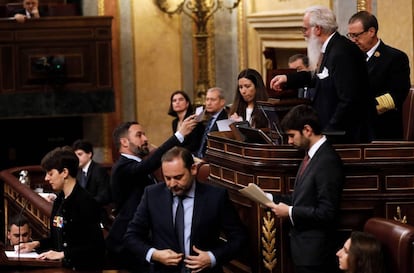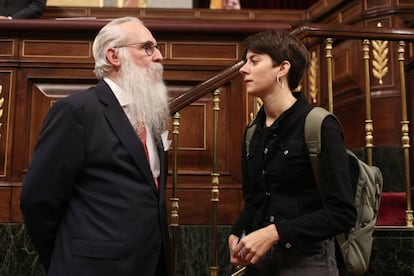Spanish Congress convenes, but how long will it last?
The newly elected members of Congress and the Senate are being sworn in today, but after the last parliament lasted just seven months, there are doubts that the ongoing stalemate can be resolved

A new Congress was convening in Spain on Tuesday amid significant political fragmentation and no certainty that the caretaker prime minister, Pedro Sánchez of the Socialist Party (PSOE), will secure enough support to form a government following the inconclusive repeat election of November 10.
The newly elected members of Congress and the Senate are due to be sworn in over the day, marking the beginning of the 14th Cortes Generales, as the lower and upper parliaments of Congress and Senate are referred to in Spanish. Spaniards are no doubt hoping that this political term will have a longer shelf life than the previous one, which lasted no more than seven months after Sánchez, who had won the April 28 general election, was unable to form a government and ended up calling a repeat vote.
There is an alternative majority. And it’s not true that Sánchez only has the option of populists and nationalists
Inés Arrimadas, Ciudadanos
But early into the Tuesday session, there were already signs that things are not going to be easy. Marta Rosique, a lawmaker for the Catalan Republican Left (ERC), was supposed to read out a list of elected members of Congress. Instead, she began by naming the individuals who were recently sentenced to prison over their role in the 2017 unilateral secession attempt. The move drew loud boos from representatives for the far-right Vox party, who had made a point of arriving early and taking up the central seating area in the chamber. Until the formal constitution of the parliament, when places in Congress will be assigned, deputies can sit where they like. On Vox’s debut in parliament after the April general election, they pulled a similar stunt, bagging the seats directly behind Pedro Sánchez and his PSOE colleagues.
Sánchez, who took 120 seats in the 350-seat lower house at the November 10 polls, has stated his wish to have a new administration in place by the end of this year. The Socialist leader has already reached a preliminary deal for a coalition government with the left-wing anti-austerity bloc Unidas Podemos, but still requires further support to get himself confirmed in office at a two-round investiture vote.
This could theoretically happen before New Year’s Eve, but only if cross-party negotiations move quickly – and so far, they are not doing so. Podemos leader Pablo Iglesias said on Tuesday that he hopes “Spaniards will have their Christmas Eve dinner with a government in place,” adding: “I am optimistic, but it’s not a done deal. A lot of dialogue is required.”

Timetable
The repeat election of November has produced an even more fractured parliament than the one that emerged in April. The far-right party Vox has soared, gaining 52 seats, while the center-right Ciudadanos (Citizens) has imploded. Meanwhile the left has retreated and the conservative Popular Party (PP) has made gains.
After today’s opening session, the next step is a round of talks between political leaders and Spain’s King Felipe VI to determine whether any candidate stands a chance of becoming the next PM. If so, an investiture session will take place, followed by a vote requiring an absolute majority. Failing that, there would be a second round where the only requirement is more yes than no votes.
Manifesto for unity
A group of 80 university scholars have endorsed a manifesto asking political parties for an agreement that will ensure the unity of Spain and the formation of a government that does not rely on Catalan separatist parties for support. The text, which was originally drafted by members of parliament, makes “a respectful call to deputies and senators so that the next government may fully exercise its powers within the Constitution, without depending on political groups that do not accept it or wish to abolish it through illegal and illegitimate means.”
The Catalan Republican Left (ERC), a separatist party with 13 lawmakers in Congress whose abstention could put Sánchez back in office, has already said that they are in no rush to reach deals. Negotiating teams from both parties are meeting again on Tuesday, but ERC leader Pere Aragonès has underscored that their goal is not to secure more devolved powers from Madrid, but to “address the political conflict in Catalonia,” and that this requires one-on-one meetings between the governments of Spain and Catalonia to discuss “everything,” including self-determination.
“The time has come to negotiate, and in the coming weeks we will see if the PSOE is open to a sincere negotiation,” said Aragonès. The PSOE opposes holding an official referendum on independence.
A PP abstention?
Meanwhile, Sánchez has urged the PP and Ciudadanos to offer an abstention so he does not have to depend on a pro-independence party.
“There cannot be, and there will not be, a third election,” said Sánchez on Monday at the COP25 climate summit being held in Madrid. “Everyone needs to contribute something to break the deadlock. [...] I hope to find generosity when the head of state asks [the candidate] to form a government.”
A few high-profile members of the PP – including former regional premier of Madrid Esperanza Aguirre – support an abstention to take away negotiating power from ERC. And the Andalusian regional premier, Juan Manuel Moreno of the PP, said in an interview with newspaper El Mundo that there could be a grand pact with the PSOE if Sánchez stepped down and was replaced with a new leader.
But PP chief Pablo Casado has so far rejected this notion, as it would mean “the voluntary disappearance of the PP as an alternative to socialism.” He also claimed that the PSOE is seeking the Catalan separatists’ support to change the Spanish Constitution “through the back door.” Casado said that “Catalonia is being used as an alibi for a regime change.”
Inés Arrimadas, who stands to become the new leader of Ciudadanos after Albert Rivera announced his resignation over the dismal results of November 10, has sent Sánchez a letter asking for a three-way meeting of the PSOE, PP and her own party to explore an investiture agreement. “There is an alternative majority. And it’s not true that Sánchez only has the option of populists and nationalists,” said Arrimadas, whose party has 10 seats in Congress.
English version by Susana Urra.
Tu suscripción se está usando en otro dispositivo
¿Quieres añadir otro usuario a tu suscripción?
Si continúas leyendo en este dispositivo, no se podrá leer en el otro.
FlechaTu suscripción se está usando en otro dispositivo y solo puedes acceder a EL PAÍS desde un dispositivo a la vez.
Si quieres compartir tu cuenta, cambia tu suscripción a la modalidad Premium, así podrás añadir otro usuario. Cada uno accederá con su propia cuenta de email, lo que os permitirá personalizar vuestra experiencia en EL PAÍS.
¿Tienes una suscripción de empresa? Accede aquí para contratar más cuentas.
En el caso de no saber quién está usando tu cuenta, te recomendamos cambiar tu contraseña aquí.
Si decides continuar compartiendo tu cuenta, este mensaje se mostrará en tu dispositivo y en el de la otra persona que está usando tu cuenta de forma indefinida, afectando a tu experiencia de lectura. Puedes consultar aquí los términos y condiciones de la suscripción digital.








































